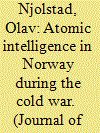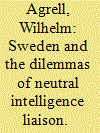|
|
|
Sort Order |
|
|
|
Items / Page
|
|
|
|
|
|
|
| Srl | Item |
| 1 |
ID:
073527


|
|
|
|
|
| Publication |
2006.
|
| Summary/Abstract |
Thanks to its geographical location and close military ties to the US and Britain, Norway took substantial part in the Western intelligence effort against the Soviet nuclear weapons programme during the Cold War. Norway's relative proximity to the nuclear weapons test sites on Novaya Zemlya and the nuclear submarine bases on the Kola Peninsula was of particular importance in this regard. Whereas the tasks of surveying the development, deployment and possible employment of Soviet nuclear forces always had first priority, Western atomic intelligence conducted from Norwegian soil and waters was occasionally aimed even at gathering information about the geophysical and possible long-term medical and environmental implications of high-yield nuclear explosions in the atmosphere.
|
|
|
|
|
|
|
|
|
|
|
|
|
|
|
|
| 2 |
ID:
073524


|
|
|
|
|
| Publication |
2006.
|
| Summary/Abstract |
This paper demonstrates that US-Scandinavian intelligence relations in general, and Signals Intelligence (Sigint) relations in particular, during the period 1945 through 1960 were more extensive and complicated than had previously been believed. Bilateral US intelligence liaison relations with nominally neutral Sweden were of particular importance in the early years of the Cold War given its geographic location adjacent to the northwestern portion of the USSR. Moreover, the importance of Sigint received from the three principal Scandinavian countries covered by this paper (Norway, Denmark, and Sweden) proved to be quite important to the US intelligence community during the early years of the Cold War, when the US Sigint infrastructure was relatively weak and stretched thin by commitments in Asia and elsewhere. This paper covers the quantity, quality, and types of intelligence information provided to the US by each of the Scandinavian nations, demonstrating that the nature of US intelligence relations with these countries changed substantially as time went by.
|
|
|
|
|
|
|
|
|
|
|
|
|
|
|
|
| 3 |
ID:
073528


|
|
|
|
|
| Publication |
2006.
|
| Summary/Abstract |
This article analyzes why US leaders did not use nuclear weapons during the Vietnam War. To date, there has been no systematic study of US decision-making on nuclear weapons during this war. This article offers an initial analysis, focusing on the Johnson and Nixon administrations. Although US leaders did not come close to using nuclear weapons in the conflict, nuclear options received more attention than has previously been appreciated. Johnson's advisers raised the issue of nuclear weapons and threats on several occasions, and Henry Kissinger, Nixon's national security adviser, looked into nuclear options to bring the war to an end. Ultimately, however, both administrations privately rejected such options. The conventional explanation for the non-use of nuclear weapons during the Cold War - deterrence - is insufficient to explain the Vietnam case. This article analyzes the role of military, political and normative considerations in restraining US use of nuclear weapons in the Vietnam War. It argues that while military and political considerations, including escalation concerns, are part of the explanation, a taboo against the use of nuclear weapons played a critical role.
|
|
|
|
|
|
|
|
|
|
|
|
|
|
|
|
| 4 |
ID:
073525


|
|
|
|
|
| Publication |
2006.
|
| Summary/Abstract |
This article deals with Scandinavian intelligence cooperation and its significance for Swedish security policy during the first part of the Cold War. First, the development of the cooperation is described. Second, it is related to a wider context. Third, intelligence in Swedish security policy-making is discussed. Common security interests caused the cooperation. For Sweden, it represented an important part of the wider contacts with the West. Although military intelligence was important for Swedish security policy-making in some respects (e.g. military readiness), it did not have a significant influence in others (e.g. the politicians' threat perceptions). One important reason is the Swedish tradition of weak connections between the political and military leadership.
|
|
|
|
|
|
|
|
|
|
|
|
|
|
|
|
| 5 |
ID:
073526


|
|
|
|
|
| Publication |
2006.
|
| Summary/Abstract |
Throughout the Cold War Sweden pursued a declared policy of non-alignment. Sweden nevertheless established security links with a number of Western powers, first of all Britain and the US. The most extensive links were developed in two areas - military technology and intelligence. Intelligence liaison was of crucial importance for the security of non-aligned Sweden, but also significant for the major Western powers in filling gaps in intelligence collection. But intelligence liaison also served as an instrument in a closed policy arena where Sweden could receive or pay back favours, according to a pattern established already during World War II. However, intelligence liaison contained policy dilemmas, some of a more general nature, some specific for a country with an overt policy of non-alignment.
|
|
|
|
|
|
|
|
|
|
|
|
|
|
|
|
| 6 |
ID:
073529


|
|
|
|
|
| Publication |
2006.
|
| Summary/Abstract |
Wellington's use of intelligence developed throughout his military career. Arguably, his experiences in India taught him the importance of intelligence, but it was during the Peninsular War that he honed his analytical techniques. As the war progressed, he developed sophisticated methods for the integration of strategic intelligence - largely gathered by civilian agents - with operational intelligence - collected by military personnel. This allowed him to develop operational conceptualisation, which in turn contributed to the successes he achieved over the French forces in Iberia. However, more than anything, it was his considered use of intelligence, combined with intricate deception operations in the latter stages of the conflict, which deprived the French of reliable intelligence on his own movements, and demonstrated his understanding of the importance of intelligence. This article investigates Wellington's increasing awareness of the importance of intelligence and deception during the Peninsular War.
|
|
|
|
|
|
|
|
|
|
|
|
|
|
|
|
|
|
|
|
|